Conservative wave
The conservative wave (Portuguese: onda conservadora; Spanish: ola conservadora), or blue tide, is a right-wing political phenomenon that emerged in the mid-2010s in South America as a direct reaction to the pink tide.[1][2]
.svg.png.webp) | .svg.png.webp) |
| Map of Latin America showing countries with members of the Sao Paulo Forum ruling parties (red) and non-Sao Paulo Forum ruling parties (blue) in 2011 (left) and 2018 (right). | |
After a decade of leftist governments, their influence has declined as in Argentina the conservative liberal Mauricio Macri succeeded the Peronist Cristina Fernández de Kirchner in 2015; in Brazil, there was Dilma Rousseff's impeachment process that resulted in Rouseff's departure and the rise of her Vice President Michel Temer to power in 2016; in Chile the conservative Sebastián Piñera succeeded the socialist Michelle Bachelet in 2017 just as it was in 2009; and in 2018 the far-right congressman Jair Bolsonaro became 38th President of Brazil.[3]
The conservative phenomenon has been compared with the election of Donald Trump as president of the United States, the appointment of Narendra Modi as the prime minister of India, and the growth of the right-wing populism and neo-nationalism in Europe as similar phenomena.[4] The growing numbers and influence of strongly socially conservative and prosperity theology-believers among the evangelical Christian communities in Latin America has also been pointed as one of the factors behind the phenomenon.[5][6][7][8]
Locations
Argentina
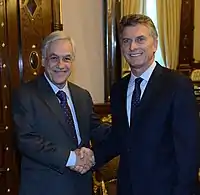
In Argentina, the election of the centre-right Mauricio Macri in November 2015 as President of Argentina brought a right-wing government to power, although the populist movements of Peronism and Kirchnerism (tied to its leader Cristina Fernández de Kirchner's popularity)[9] initially remained somewhat strong.[10] The former engineer and Buenos Aires mayor cut energy subsidies, ended currency controls, and started other reforms that have allowed Argentina to win back the favor of international financial markets. In October 2017, Macri established a more firm hold on power when many candidates of his Cambiemos party enjoyed victories in the 2017 Argentine legislative election.[11] A series of corruption scandals involving Macri and his allies developed during his presidential period,[12] including six federal investigations for alleged money laundry, influence trafficking and illegal increase of his family's wealth[13] while also being involved in the Panama Papers scandal.[14] In 2017, Macri's pension reform faced massive protests in opposition that some members of the press described as the most violent protest in Buenos Aires in decades.[15][16] Media reporters have accused Macri's government of police brutality and violent repression while handling these[17][18] and other recent protests.[19]
In October 2019 Mauricio Macri lost the Argentinian presidential election to the left-leaning Alberto Fernández who was sworn into office in December 2019.[20]
Brazil
In Brazil, it began roughly around the time Dilma Rousseff won the 2014 presidential election in a tight election, kicking off the fourth term of the Workers' Party in the highest position of government.[21] In addition, according to the political analyst of the Inter-Union Department of Parliamentary Advice Antônio Augusto de Queiroz the National Congress elected in 2014 may be considered the most conservative since the "re-democratization" movement, noting an increase in the number of parliamentarians linked to more conservative segments, such as ruralists, military, police and the religious.
The subsequent economic crisis of 2015 and investigations of corruption scandals led to a right-wing movement that sought to rescue ideas from economic liberalism and conservatism in opposition to left-wing policies.
.jpg.webp)
At the same time, young liberals such as those that make up the Free Brazil Movement emerged among many others. For Manheim (1952), within a single real generation there may be several generations which he called "differentiated and antagonistic". For him, it is not the common birth date that marks a generation, though it matters, but rather the historical moment in which they live in common. In the case, the historical moment was the impeachment of Dilma Rousseff. They can be called the "post-Dilma generation".[22]
Centrist interim President Michel Temer took office following the impeachment of President Rousseff. Temer held 3% approval ratings in October 2017,[23] facing a corruption scandal after accusations for obstructing justice and racketeering were placed against him.[24] He managed to avoid trial thanks to the support of the right-wing parties in the Brazilian Congress.[23][24] On the other hand, President of the Senate Renan Calheiros, who was acknowledged as one of the key figures behind Rousseff's destitution and member of the centrist Brazilian Democratic Movement Party, was himself removed from office after facing embezzlement charges.[25]
Far-right candidate Jair Bolsonaro of the Social Liberal Party was the winner of the 2018 presidential election followed by left-wing former Mayor of São Paulo Fernando Haddad of Luiz Inácio Lula da Silva's Workers' Party.[26] Lula was banned to run after being convicted on criminal corruption charges and being imprisoned.[27][28][29] Bolsonaro has been accused of racist,[30] xenophobic,[31] misogynistic[32] and homophobic rhetoric.[33][34]
Background
According to Roberto Schwarz, the left has historically had cultural hegemony. It can be considered its peak in the 1990s, a period that coincides with the beginning of the pink tide, or leftward turn in Latin American politics. In his essay Culture and Politics in Brazil (1964–1969), literary critic and professor Roberto Schwarz already observed the phenomenon. In full military regime, he writes:
[T]here is relative cultural hegemony of the left. It can be seen in the bookstores of São Paulo and Rio de Janeiro, full of Marxism, in theatrical premieres [...] in the student movement or in the proclamations of the advanced clergy. In the shrines of bourgeois culture, the left sets the tone.
— Roberto Schwarz, Culture and Politics[35]
Schwarz feared that the left would lose its cultural hegemony after the hardening of the military regime, but that did not happen. With the return of democracy, the left's cultural and intellectual hegemony was still enormous. In his work entitled Literature (1988), sociologist and writer Antonio Candido already observed the phenomenon. It was rare to find any politician or entrepreneur who risked defining himself as conservative as they were all "invariably centered, even center-left, including the frankly reactionary".
Guatemala
In Guatemala, centre-left social democratic leader Alvaro Colom of the National Unity of Hope was elected in 2007, being the only modern day leftist president in the country. Colom's successor, right-wing Liberal Otto Pérez Molina, was forced to resign his presidency due to popular unrest[36][37] and corruption scandals that ended with his arrest.[38] Following Molina's resignation, right-wing Jimmy Morales was elected into office. Morales is currently under investigation for illegal financing.[39] Morales successor Alejandro Giammattei also experienced massive popular protests.
Honduras
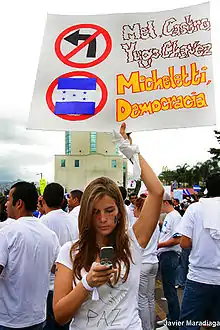
In Honduras, Manuel Zelaya's turn to the left during his tenure resulted in the 2009 Honduran coup d'état which was condemned by the entire region, including the United States. Years later after the coup, Zelaya said his overthrow was the beginning of the "conservative restoration" in Latin America.[40]
After the coup, the next democratically elected President was right-wing Porfirio Lobo Sosa (2010–2014) and then, right-wing Juan Orlando Hernández of the conservative National Party, won the presidential election over left-wing Xiomara Castro (Zelaya's wife) by a slight margin. Soon after, Hernández reformed the Constitution to allow himself to be candidate for immediate reelection (something until then forbidden by Honduran law) and ran as candidate for the 2017 presidential election in what some observers question as undemocratic, authoritarian-leaning[41][42] and corrupt.[43][44] During the election, Hernández' tight self-proclaimed victory over Salvador Nasralla of the Opposition Alliance against the Dictatorship alongside accusations of voter fraud cause massive riots throughout Honduras. The declaration of a curfew from the country label as illegal by some jurists[45] according to the Constitution and the violent repression of the protests left at least seven dead and dozens injured.[46] Due to the general popular unrest and voter fraud allegations, the Organization of American States requested a new election to no avail.[47][48][49][50]
Paraguay
In Paraguay, the conservative, right-wing Colorado Party ruled the country for over sixty years, including the American-supported[51][52][53][54] dictatorship of Alfredo Stroessner that lasted thirty-five years, from 1954 to 1989. Paraguay is one of the poorest countries of South America. This dominant-party system was temporary broken in the 2008 presidential elections, when practically the entire opposition united in the Patriotic Alliance for Change managed to elect former Bishop Fernando Lugo of the Christian Democratic Party as President of Paraguay. Lugo's government was praised for its social reforms, including investments in low-income housing,[55] the introduction of free treatment in public hospitals,[56][57] the introduction of cash transfers for Paraguay's most impoverished citizens[58] and indigenous rights.[59]
Nevertheless, Lugo did not finish his period as he was impeached despite enjoying very high approval ratings and popularity. The impeachment was rejected by the Inter-American Commission on Human Rights,[60] condemned by both right-wing and left-wing governments[61][62] and considered a coup d'état by UNASUR and Mercosur and treated accordingly with sanctions and suspensions for Paraguay.[63][64] Lugo was later elected Senator and President of the Senate. He was replaced by Vice President Federico Franco, who was distanced from Lugo by ideological reasons, opposed to the entry of Venezuela into the Mercosur, and was described as conservative.[65][66]
Paraguay's next democratically elected President, right-wing Colorado Horacio Cartes, described by human rights organizations as authoritarian and homophobe,[67] has attempted to reform the Constitution to allow himself to be re-elected indefinitely, something which caused popular uproar.[68][69][70] Cartes was also the suspect of money laundry[71][72][73] and tax evasion scandals.[74][75][76]
Peru
In Peru, Pedro Pablo Kuczynski won the 2016 presidential election, with Peru becoming yet another country that departs from a centre-left government.[77] In this election, the third candidate with major support was leftist candidate Veronika Mendoza of the Broad Front with 18% of votes.[78] Following corruption investigations surrounding Odebrecht, Peru's Congress demanded Kuczynski to defend himself in a session, with Odebrecht stating that Kuczynski's involvement with the company was legal compared to the illegalities performed by his leftist predecessor.[79] Due to the corruption scandal, the impeachment of Kuczynski was started,[80] but voted against by a slight margin in Congress.[81] After videos were leaked to the public showing bribery from the Fujimorists to keep Kuczynski in office, Kuczyinski resigned on his own.
Reception
Brazil
On the political changes that were happening in the country, a collection of twenty essays organized by Felipe Demier and Rejane Hoeveler, titled The Conservative Wave – Essays on the Current Dark Times in Brazil, was launched in 2016. In the synopsis, professor emeritus José Paulo Netto characterizes the right-wing opposition as being downgrade of intelligence.[22] It is also emphasized the rootedness of reactionary thinking and practices in Brazilian state powers and Brazilian society in multiple dimensions as well as the challenges that the left will have to face. However, many Brazilians who support Bolsonaro's government believe that the PT and rampant corruption are to blame for difficulties in the Brazilian economy.[82][83]
Head of the states and governments
Presidents
Below are right-wing and centre-right presidents who have held office in Latin America since 2010. Note that centre-right presidents are marked with *.
Timeline

See also
References
- McMaken, Ryan (2016). Latin America's Pink Tide Crashes On The Rocks. Mises Institute.
- Reid, Michael (2015). "Obama and Latin America: A Promising Day in the Neighborhood". Foreign Affairs. 94 (5): 45–53.
Washington's trade strategy was to contain Chávez and his dreams of continental domination [...], the accurate assessment that Chávez was a threat to his own people. [...] Chávez's regional influence peaked around 2007. His regime lost appeal because of its mounting authoritarianism and economic difficulties.
- Ospina, Jose (28 October 2018). "Is there a right-wing surge in South America?". DW. Retrieved 10 December 2018.
- "ANÁLISE: Crescimento de Jair Bolsonaro inclui Brasil em onda conservadora global". Folha de S.Paulo.
- Corrales, Javier (17 January 2018). "A Perfect Marriage: Evangelicals and Conservatives in Latin America". The New York Times. Retrieved 2 June 2018.
- Pointu, Tupac (6 October 2018). "Evangelicals wield voting power across Latin America, including Brazil". The Times of Israel. Retrieved 1 November 2018.
- Corrales, Javier (17 January 2018). "A Perfect Marriage: Evangelicals and Conservatives in Latin America". The New York Times. Retrieved 2 June 2018.
- Lissardy, Gerardo. ""La fuerza política más nueva": cómo los evangélicos emergen en el mapa de poder en América Latina" [The newest political force ": how evangelicals emerge on the map of power in Latin America] (in Spanish). BBC. Retrieved 2 June 2018.
- Argentina's Ex-President Wants Everyone to Know She's Not Scared of Corruption Probes – VICE News, 14 April 2016.
- Noel, Andrea (29 December 2015). "The Year the 'Pink Tide' Turned: Latin America in 2015 | VICE News". VICE News. Retrieved 30 December 2015.
- "Macri's coalition sweeps Argentina's mid-term vote". CNBC. 23 October 2017. Retrieved 4 November 2017.
- Misculin, Nicolás. "As Argentine corruption probe grows, Macri allies feel the heat". Reuters. Retrieved 5 November 2017.
- Calatrava, Almuneda (2017). "Argentine Clean-Up President Macri Finds Scandals of His Own". US News. Retrieved 5 November 2017.
- Watts, Jonathan. "Argentina's president Mauricio Macri fights back after Panama Papers reveal offshore links". The Guardian. Retrieved 5 November 2017.
- "Buenos Aires protests: Police fire tear gas as violence breaks out over Argentina pension reform". The Telegraph. 15 December 2017. Retrieved 19 December 2017.
- "The Americas Clashes rage as Argentine lawmakers suspend pension debate". Washington Post. Retrieved 19 December 2017.
- Centre for Legal and Social Studies. "Argentina: The right to protest in danger". 16 December 2017. Retrieved 19 December 2017.
- "Impresiona video de cómo cientos de manifestantes acorralan a policías". Televisa. 18 December 2017. Retrieved 20 December 2017.
- Delgado, Sofía (5 September 2017). "Brutality returns to Argentina's streets as police moves in on peaceful demonstrators". Express. Retrieved 20 December 2017.
- Aires, Reuters in Buenos (2019-12-10). "'We're back': Alberto Fernández sworn in as Argentina shifts to the left". the Guardian. Retrieved 2020-07-18.
- Boulos, Guilherme. "Onda Conservadora". Retrieved 11 October 2017. Cite journal requires
|journal=(help) - Soares, José Manoel Montanha da Silveira (2017). "A onda conservadora: ensaios sobre os atuais tempos sombrios no Brasil". Revista Em Pauta. 15 (39). doi:10.12957/rep.2017.30390. ISSN 2238-3786.
- Phillips, Don (17 October 2017). "Accused of corruption, popularity near zero – why is Temer still Brazil's president?". The Guardian. Retrieved 5 November 2017.
- Watson, Kay. "Brazil's President Temer avoids corruption trial". BBC. Retrieved 5 November 2017.
- "Brazil's Senate president ousted over embezzlement charges". The Guardian. 6 December 2016. Retrieved 5 November 2017.
- "Lula lidera, e Bolsonaro se consolida em 2º, aponta Datafolha". Poder. December 2, 2017. Retrieved 7 December 2017.
- Rapoza, Kenneth (21 September 2016). "Lula's 'Clear Conscience' And Brazil's Inability To Explain Petrobras Scandal". Forbes. Retrieved 28 September 2016.
- Fonseca, Alana; Gimenes, Erick; Kaniak, Thais; Dionísio, Bibiana (12 July 2017). "Lula é condenado na Lava Jato no caso do triplex" (in Portuguese). G1. Retrieved 23 September 2017.
- "Urgente: Lula É Condenado Por Unanimidade Pelo TRF-4".
- Gavin Fernando (29 April 2016). "Is this the world's most repulsive politician?". News.com.au.
- Simon Romero (7 May 2016). "Conservative's Star Rises in Brazil as Polarizing Views Tap Into Discontent". The New York Times.
- "The Most Misogynistic, Hateful Elected Official in the Democratic World: Brazil's Jair Bolsonaro – The Intercept". The Intercept. 11 December 2014.
- "A lightning rod for attacks by Brazil's right wing". Los Angeles Times. Retrieved 7 September 2018.
- Watts, Jonathan (18 April 2016). "Dilma Rousseff: Brazilian congress votes to impeach president". The Guardian. ISSN 0261-3077. Retrieved 18 April 2016.
- "Existe mesmo uma onda conservadora?". revistaepoca.globo.com.
- Malkin, Elisabeth; Ahmed, Azam (1 September 2015). "President Otto Pérez Molina Is Stripped of Immunity in Guatemala". The New York Times.
- "Guatemala President Resigns Amid Corruption Probe". The New York Times. Associated Press. 3 September 2015.
- Romo, Rafael; Botelho, Greg (3 September 2015). "Otto Pérez Molina out as Guatemala's President, jailed". CNN.
- "Presidente de Guatemala llega a la mitad de su mandato acechado por la corrupción". La Nación. Retrieved 21 March 2018.
- Luzzani, Telma (22 May 2017). "La restauración conservadora comenzó con mi derrocamiento". Página/12 (in Spanish). Retrieved 26 December 2019.
- Galeana, Fernando (2017). "Honduran Elections and the Resurfacing Of Authoritarianism". Committee on US-Latin America relations. Retrieved 5 November 2017.
- "Eight years after a coup, a heated election in Honduras". The Economist. Apr 12, 2017. Retrieved 5 November 2017.
- Frank, Dana (January 25, 2014). "Frank: Hernández's election was built on corruption". Chron. Retrieved 5 November 2017.
- "Juan Orlando Hernández – the man who should resign". New Internationalist. 6 July 2015. Retrieved 5 November 2017.
- Camila Parodi, Nadia Fink, Julieta Lopresto, and Laura Salomé Canteros (2 December 2017). "Honduras: Mesa Nacional de Derechos Humanos denuncia asesinatos y detenciones tras protestas por fraude electoral" (in Spanish). El Ciudadano. Archived from the original on 2017-12-03. Retrieved 2017-12-03.CS1 maint: multiple names: authors list (link)
- "Honduras: posible fraude, muertos y mucha tensión" [Honduras: possible fraud, deaths and great tension] (in Spanish). Tegucigalpa: ABC Color. EFE. 2 December 2017. Retrieved 2 December 2017.
- Main, Alexander; McCurdy, Daniel. "The U.S. Double Standard on Elections in Latin America and the Caribbean". NACLA. Retrieved 19 December 2017.
- MALKIN, ELISABETH (2017). "Honduran President Declared Winner, but O.A.S. Calls for New Election". New York Times. Retrieved 19 December 2017.
- Gómez, Carlos Eduardo (2017). "OAS: "SERIOUS QUESTIONS REMAIN OVER HONDURAS ELECTION"". Latin American Post. Retrieved 19 December 2017.
- "Clashes in Honduras after OAS says president vote win is illegitimate". Reuters. 2017. Retrieved 19 December 2017.
- Richard S. Sacks. "The Stronato". In Hanratty, Dannin M. & Sandra W. Meditz. Paraguay: a country study. Library of Congress Federal Research Division (December 1988).
 This article incorporates text from this source, which is in the public domain.
This article incorporates text from this source, which is in the public domain. - Stanley, Ruth (2006). "Predatory States. Operation Condor and Covert War in Latin America/When States Kill. Latin America, the U.S., and Technologies of Terror". Journal of Third World Studies.
- Hogg, Jonas (11 October 2006). "Exiled professor advocates equality, democracy".
- "History of Paraguay, The Stronato". motherearthtravel.com.
- http://www.rabobank.com/content/images/Paraguay-201101_tcm43-105909.pdf
- "PARAGUAY: Mixed Results for Lugo's First 100 Days – IPS". Ipsnews.net. 25 November 2008. Archived from the original on 5 October 2011. Retrieved 1 February 2012.
- "2012: Transformationsindex". Archived from the original on 14 April 2013. Retrieved 9 January 2018.
- "The boy and the bishop". The Economist. 30 April 2009.
- "The Bishop of the Poor: Paraguay's New President Fernando Lugo Ends 62 Years of Conservative Rule". Democracynow.org. Retrieved 5 January 2010.
- IACHR, 23 June 2012, IACHR Expresses Concern over the Ousting of the Paraguayan President
- "Argentina "no convalidará el golpe en Paraguay" mientras que Brasil sugirió que quedaría fuera de la Unasur y el Mercosur" [Argentina "will not support the coup in Paraguay" and Brazil suggested that it would be left out of Unasur and Mercosur]. La Nación (in Spanish). 22 June 2012. Retrieved 22 June 2012.
- Orsi, Peter (24 June 2012). "Does Paraguay risk pariah status with president's ouster?". Associated Press.
- "Venezuela Condemns "State Coup" in Paraguay, Cuts Oil Shipments".
- "Paraguay suspended from Mercosur". The Guardian. Associated Press. 29 June 2012.
- "Federico Franco: un médico liberal 'enemigo' de Chávez al frente de Paraguay". 20 minutos (in Spanish). EFE. 23 June 2012. Retrieved 26 December 2019.
- "Un médico y conservador asciende a la presidencia". La Nación (in Spanish). AFP. 23 June 2012. Retrieved 26 December 2019.
- "Horacio Cartes: Millionaire. Criminal. Business titan. Homophobe. The next president of Paraguay?". The Independent. 19 April 2013.
- Romero, Simon (31 March 2017). "Protests Erupt in Paraguay Over Efforts to Extend President's Term". The New York Times. p. A9. Retrieved 1 April 2017.
- "'A coup has been carried out': Paraguay's congress set alight after vote to let president run again". The Guardian. London. 1 April 2017. Retrieved 1 April 2017.
- Desantis, Daniela (1 April 2017). "A protester was killed in Paraguay after a secret Senate vote for a constitutional amendment". The Independent. London. Retrieved 3 April 2017.
- "Horacio Cartes wins comfortably in Paraguay". Buenos Aires Herald. 22 April 2013.
- "WikiLeaks: Cartes desmiente lavado de dinero en el Banco Amambay" (in Spanish). Última Hora. 14 November 2011.
- "10BUENOSAIRES5, ZA-09-0007/YAZ1K MARTINETTI, JULIO et al/ OPERATION HEART OF". WikiLeaks. 5 January 2010. Cite journal requires
|journal=(help) - "Bank Owned by Paraguay's Leading Presidential Candidate Linked to Tax Haven". International Consortium of Investigative Journalists. 15 April 2013.
- "Banco para "alternativas no disponibles en Paraguay" (in Spanish). ABC Color. 16 April 2013.
- "Campaign marked by censorship, post-election reprisals feared". Reporters without Borders. 18 April 2013.
- Oliver Stuenkel (June 8, 2016). "Peru: Kuczynski victory is part of a broader political shift in the region". Post Western World. Retrieved June 12, 2016.
- "ONPE – ELECCIONES GENERALES 2016: RESULTADOS PRESIDENCIALES". Archived from the original on 2016-06-10. Retrieved 21 April 2016.
- "Peru's Congress prepares to oust President Kuczynski". The Japan Times. 2017-12-17. ISSN 0447-5763. Retrieved 2017-12-18.
- "Peru Odebrecht scandal: President Kuczynski faces impeachment". BBC. 15 December 2017.
- "Lawmakers who helped Peru president survive impeachment bid say democracy won". Efe.com. Retrieved 28 December 2017.
- "A onda conservadora". Livraria Cultura. Retrieved 15 October 2017.
- "Brasil levará ao menos 50 anos para se livrar da massificação que o PT criou na educação universitária". Jornal Opção. 24 September 2016. Retrieved 2 December 2019.
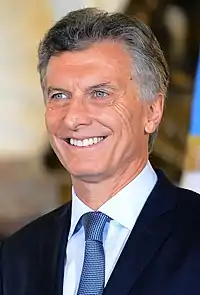

_(cropped).jpg.webp)
.jpg.webp)

.jpg.webp)
_(cropped).jpg.webp)
.jpg.webp)
.jpg.webp)
_(cropped).jpg.webp)
_(cropped).jpg.webp)
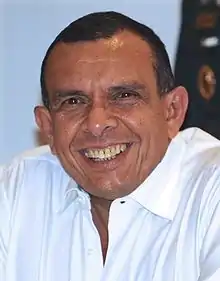
.jpg.webp)

_3x4_Cropped.jpg.webp)

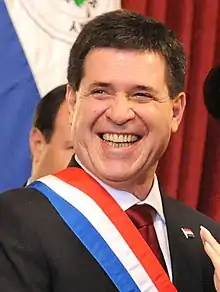

.jpg.webp)
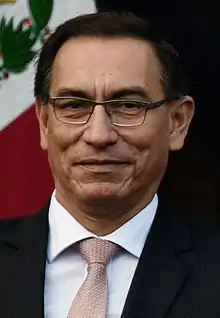
.jpg.webp)
.jpg.webp)
